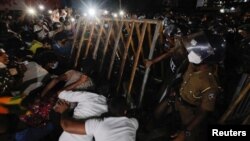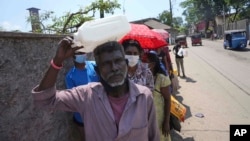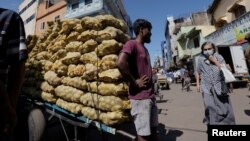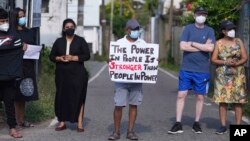Sri Lanka faces unprecedented turmoil as a deepening economic crisis triggers raging street demonstrations while a political impasse plays out as President Gotabaya Rajapaksa defies calls to step down, complicating efforts to alleviate the situation, analysts say.
As lines for cooking fuel, gasoline, diesel fuel and food grow longer and crippling power cuts plunge homes into hours of darkness, public anger has mounted, with people from all walks of life joining spontaneous protests – students, the middle class and low-income workers.
The acute shortages have arisen as the country struggles to pay for essential imports, while foreign exchange reserves have been depleted to critically low levels.
"The prices of fuel, petrol, bread has almost doubled. Rice and basic staples have gone up rapidly in the past two months," said Jehan Perera, director of the non-governmental advocacy group the National Peace Council, in Colombo.
There are also dire warnings of an impending health crisis. Sri Lanka's medical association has said that critical shortages of drugs and medical equipment will affect hospital emergency services in coming weeks.
It is a massive setback for a country of 22 million people that was ranked three years ago as an upper middle-income nation by the World Bank.
The Sri Lankan rupee has depreciated sharply, while food inflation surged to nearly 30% in March. Foreign exchange reserves have dwindled to less than $2 billion, even as the country's foreign debt adds up to about $50 billion.
Economists say that while the crisis was years in the making in a country where expenditures have exceeded income, mismanagement during the last two years led to the current problems.
"The government started using its foreign exchange reserves to pay for its debt. It basically self-destructed, with a series of missteps," Murtaza Jafferjee, chairman of Advocata Institute, a research organization based in Colombo, said.
Tax breaks given after the government came to power to fulfill electoral promises depleted tax revenues. The government had argued that it would stimulate the economy.
The coronavirus pandemic battered the tourism sector, a vital source of revenue for the island nation of scenic tropical beaches.
A sudden ban last year on imported chemical fertilizers hit crop production and food supplies, especially the vital rice crop. The ban was imposed in a bid to switch to organic farming, but critics say it was also meant to conserve shrinking foreign exchange reserves. Although it has now been lifted, it has contributed to food shortages, with farmers saying their yields have dropped significantly.
Critics also blame huge infrastructure projects built by China for adding to the country's massive debt burden. "We built infrastructure that would take 20 to 30 years to pay back... We also selected white elephant projects," Jafferjee said.
Surging commodity prices because of the Ukraine crisis became a tipping point, as imports of commodities such as fuel and wheat became more expensive.
The government appointed a panel of experts Thursday to address the debt crisis and "lead towards sustainable and inclusive recovery for Sri Lanka." A government statement said it will work with the International Monetary Fund.
However, there are fears that political gridlock will make it harder to address the crisis. The entire cabinet resigned this week in an apparent bid to mollify public ire, whose chants of "Go home, Gota" are heard on streets nationwide and have become a trending hashtag on Twitter.
The administration is working with only a handful of ministers and there is no finance minister -- a minister appointed this week quit in a day.
About 40 lawmakers have walked out of the ruling coalition, leaving the government in a minority. Opposition parties have rejected the president's call to join a unity government and said they will call for a no-confidence vote on leadership if there is no effective action to resolve the economic crisis.
Rajpaksa has rejected calls to step down.
"As a responsible government, we state that President Gotabaya Rajapaksa will not resign from his post under any circumstances," chief government whip in parliament Johnston Fernando said Wednesday.
Rajapaksa was voted into power in 2019 with a landslide mandate after deadly attacks by Islamist militants raised security concerns.
Political analysts say it is a stunning reversal for the country's pre-eminent political dynasty that controls the government. The president's brother, Mahinda Rajapaksa, is the prime minister. His younger brother and other family members previously controlled key ministries such as finance, agriculture and education. They have now stepped down.
"The situation is volatile. People basically want the entire family to go," the National Peace Council's Perera said. "For the public, they have become a symbol of corrupt politics in the country."
Analysts say the government has little choice but to seek an IMF bailout.
"We do not have access to international financial markets because credit rating agencies have downgraded us to junk and below junk status. So we are in an absolute bind," said Paikiasothy Saravanamuttu, the head of research organization the Center for Policy Alternatives in Colombo.
There are fears that the economic hardships facing the country will not ease soon.
"The situation is very, very dire. There is no quick fix at all. It is a question of putting in place a set of things that will eventually reach a point of stability," warned Saravanamuttu. "Things are going to get worse before they get better. I don't think there is any escaping from that."
The Advocata Institute's Jafferjee said Sri Lankans will have to settle for significantly lower standards of living for some time, adding, "We will have to rebuild our country from scratch. It is one of our darkest hours."







